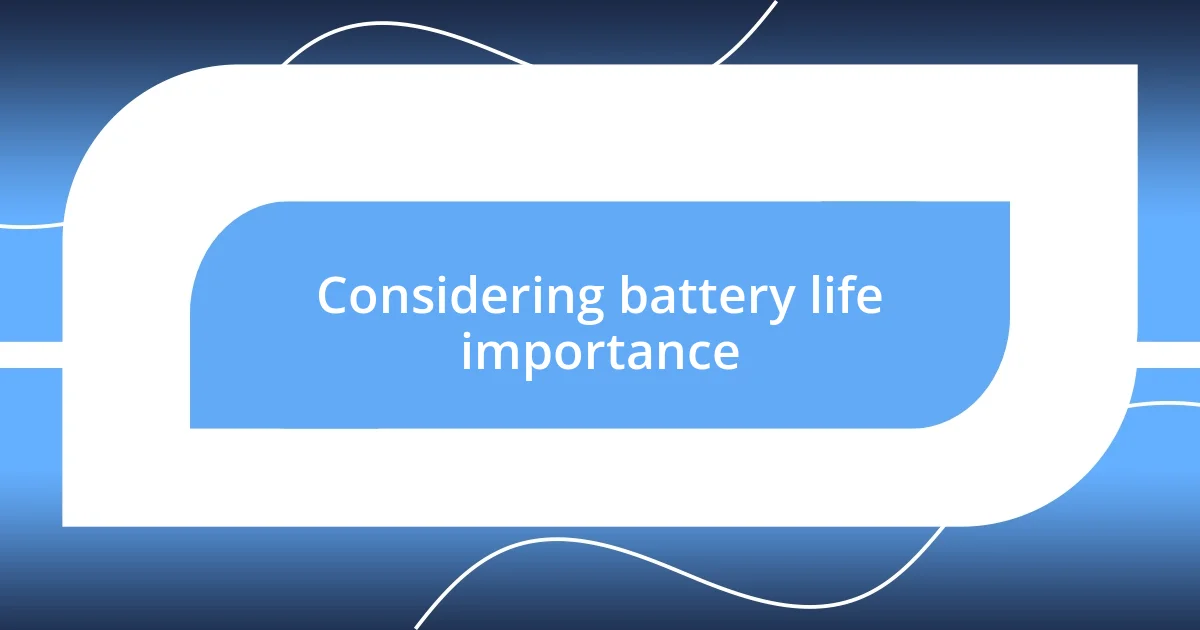Key takeaways:
- Prioritize performance specifications (CPU, RAM, and storage type) to ensure efficient multitasking and quick file access.
- Evaluate battery life and real-user reviews to avoid device failures during crucial tasks and ensure reliability in daily use.
- Trust personal instinct and consider emotional connection when making the final decision, alongside warranty and support services for peace of mind.

Defining my laptop needs
When I think about defining my laptop needs, I often reflect on the type of tasks I perform daily. For instance, do I need something lightweight and portable for travel, or is my primary need a powerhouse for intense gaming or graphic design? This consideration directly impacts my choice, as I experience the difference in performance even with everyday tasks like browsing or work-related applications.
A few years ago, I spent hours choosing a laptop that could handle both my design work and some light gaming. I vividly remember the frustration of lagging during a presentation because my laptop couldn’t keep up. It was a wake-up call that made me realize the importance of prioritizing performance specs over aesthetic factors. What features have been crucial for you in your experiences?
Now, I also think about battery life quite a bit. During my last trip, my laptop died halfway through a presentation, and it taught me a valuable lesson. Since then, I’ve made it a habit to ensure any new laptop I consider has substantial battery life. What about you? Have you ever been caught without a charge when you needed it the most?

Analyzing essential specifications
When diving into essential specifications, I always prioritize the processor as the heart of my laptop. My experience has shown that a more powerful CPU can make a significant difference, especially when juggling multiple applications. For instance, I remember a project where using a less capable processor led to frustrating delays during video editing. It taught me that investing in a solid CPU upfront saves time and stress later on.
Another vital specification that cannot be overlooked is RAM. I’ve noticed that when I opted for 16GB instead of 8GB, my overall experience improved tremendously. Working on demanding software became a breeze, and multitasking felt seamless. How much RAM do you typically consider? In my journey, I’ve discovered that having adequate RAM lets me keep various tabs open without the laptop slowing down.
Lastly, I can’t emphasize enough the importance of storage options. Whether choosing between an SSD or HDD, the speed of an SSD has completely transformed how quickly I can access large files. When I switched to an SSD, the startup times were cut by over half, which amazed me. It’s a game-changer that I wholeheartedly recommend to anyone serious about their laptop’s performance.
| Specification | Importance |
|---|---|
| Processor (CPU) | The backbone of performance; essential for heavy multitasking and demanding software. |
| RAM | Crucial for smooth multitasking; more RAM equals better performance when using multiple applications. |
| Storage Type | SSD offers faster access and boot times compared to HDD, significantly enhancing user experience. |

Comparing different brands
When I set out to compare different laptop brands, I often find myself in a maze of choices. Each brand comes with its unique flair and set of features that can sway my decision one way or another. I remember a particular time I was torn between Dell and HP; I felt drawn to the sleek designs of Dell, but HP had the reliable performance that I craved. Understanding what each brand excels in can really help streamline my search.
Some aspects to consider when comparing brands include:
- Customer Support: I once had an issue with my laptop, and the support I received from Lenovo made all the difference. Their responsiveness blew me away!
- Build Quality: I swipe through reviews, noting how some brands, like Apple, offer premium materials, while others may cut costs in this area.
- Performance Consistency: I’ve noticed that brands like ASUS shine in gaming, making them my go-to for high-performance needs.
- Warranty and Repair Options: It’s comforting to find brands that provide solid warranty terms—I’ve learned that this can save you stress in the long run.
Navigating through different models, I lean towards those brands that I feel have a genuine knack for innovation and quality. Recently, I compared Acer’s lightweight models against Samsung’s Galaxy Book series. While Acer impressed me with portability, I discovered Samsung offered exceptional display quality that made content consumption a joy. It’s these subtleties that can tip the scales when I’m making my final choice.

Evaluating performance benchmarks
When evaluating performance benchmarks, I always turn to reliable metrics like CPU performance scores and graphics benchmarks. I remember using software like Cinebench to assess my options when deciding on my last laptop. It felt enlightening to see how various processors ranked against each other. It’s fascinating to witness how even marginal differences in scores can translate into noticeable performance gaps in real-world applications.
Another metric that often catches my eye is the Geekbench score, which provides insights into single-core and multi-core performance. I once made the mistake of overlooking these scores while choosing a laptop, thinking the brand alone would ensure smooth operation. To my surprise, I ended up with a machine that struggled with basic tasks! It was a lesson learned the hard way—always dig deeper into those numbers.
Lastly, I make it a point to look at real user reviews focusing on performance, especially for the tasks I plan to undertake. Seeing how others have fared with the same model gives me a sense of reliability. For example, when I read reviews highlighting how a specific laptop handles gaming or photo editing, I feel more confident in making my purchase. The shared experiences resonate with me and help shape my final decision. Wouldn’t you agree that learning from others can often save us from frustrating choices?

Considering battery life importance
When it comes to battery life, I can’t stress enough how essential it is for my laptop choice. I vividly remember a time I was out on a trip, my laptop died unexpectedly, and I felt completely disconnected. That experience taught me that a reliable battery can be a lifesaver, especially during long working hours or travel. I always aim for at least 8 hours of battery life, as it provides me the freedom to work without being tethered to a power outlet.
In looking at the specs, I often dive into the actual battery capacity, measured in watt-hours (Wh). I once chose a model with a great battery life promise, only to find out that typical usage could drain it much faster. It was disappointing to say the least! I’ve found that reading user reviews about their real-world experiences with battery longevity can often reveal the truth behind those advertised numbers. Knowing how users rate their experience helps me gauge if I’ll actually get through my day without having to scramble for an outlet.
Furthermore, I’ve learned to consider how different components affect battery life. For instance, I’ve noticed that laptops with energy-efficient processors significantly enhance the lifespan of their batteries. This was a game-changer when I switched to a laptop that boasted an Intel Core i5 with good integrated graphics; I could work for hours while streaming content without worry. Isn’t it reassuring to know that a thoughtful choice in specs can lead to a much better experience? So, when I’m out there making a decision, good battery life definitely makes the list of non-negotiables for me.

Assessing customer reviews
When assessing customer reviews, I find firsthand experiences from users incredibly valuable. There was a time when I was torn between two laptops, but reading about one in particular and how the owner praised its reliability in everyday tasks sealed the deal for me. It’s amazing how a simple comment about a laptop not overheating during intensive use can sway my decision.
I also pay close attention to the patterns that emerge in the reviews. If multiple individuals mention software compatibility issues or hardware failures, it raises a red flag for me. I remember coming across a review where a user described their frustration with frequent crashes during important video calls. That insight made me rethink that model entirely! Wouldn’t it be smart to heed the warnings shared by others, especially when they highlight potential pitfalls?
Lastly, I appreciate when reviewers share their emotions tied to their device. A review that details not just the hardware but the connection someone feels with their laptop resonates with me. Finding a reviewer who talks about how their laptop has accompanied them through countless projects creates an emotional connection. It reminds me that a laptop isn’t just a device; it’s almost a companion in our daily digital lives. How often do we overlook that personal aspect in our purchasing decisions?

Making the final decision
When it comes to making the final decision, I always trust my gut instinct after gathering all the information. I recall a time I felt pressured to buy a well-reviewed laptop only to realize it didn’t excite me. It’s essential to choose a machine that not only meets my needs but also sparks that personal connection. How often have we overlooked that spark and regretted our choice later?
Once I narrow down my options, I like to visualize how each laptop fits into my daily life. For example, I still remember when I finally picked a model that was sleek and portable; it was easier to carry to meetings and coffee shops. That practical aspect really made my experience smoother and more enjoyable. Isn’t it amazing how a little bit of foresight can transform everyday tasks?
Ultimately, I also find it crucial to consider warranty and support services offered by the brand. After a mishap with a previous laptop, I can’t emphasize enough how reassuring it was to have a solid support system in case something went wrong. I mean, isn’t peace of mind something we all crave with our tech choices? Making a well-rounded decision means blending my emotional reactions with logical considerations to find the right fit.














